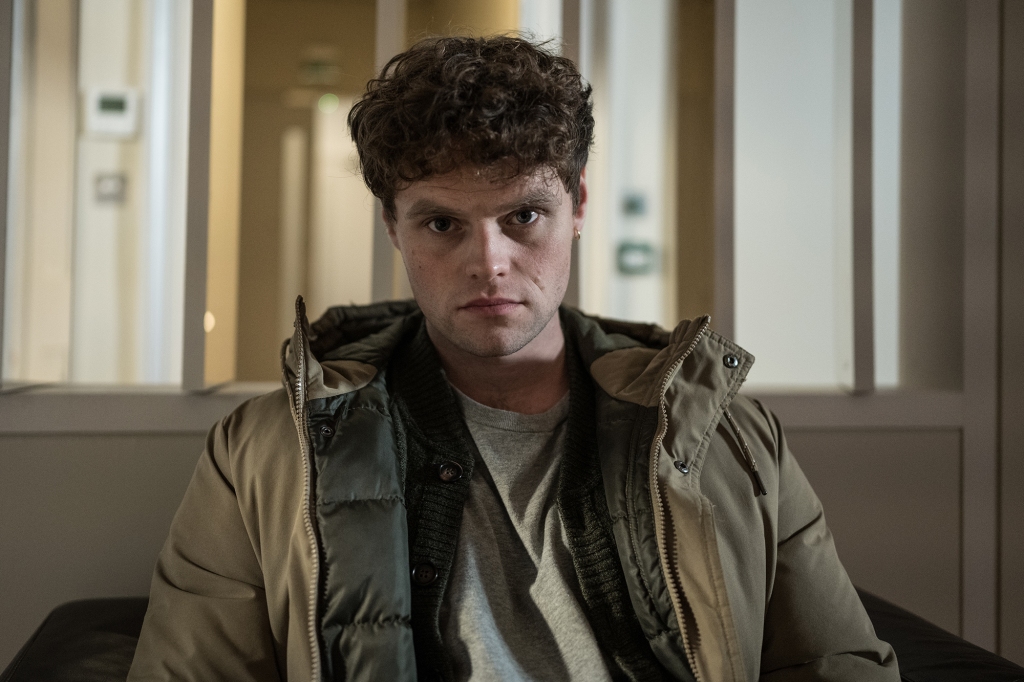Aidan Turner on Twitter reaction to ‘The Suspect: ‘absolutely wrong’
Former “Poldark” star Aidan Turner relished the ambiguity at the core of “The Suspect,” in which his Dr. Joe O’Loughlin, a married-with-child London psychologist, is accused of murdering a former patient/lover.
“There are certain things uncovered later on that [Joe] is trying to cover up,” the Irish-born Turner, 39, told The Post. “That doesn’t necessarily make him a murderer — possibly but not necessarily … and there is some sort of method to his apparent madness.”
The five-episode twisty British thriller of the “didn’t see that one coming” variety premieres Nov. 3 on Sundance Now/AMC+ (it aired in late August on ITV in the UK) and is based on Michael Robotham’s 2004 novel of the same name. Co-stars include Sian Clifford (“Fleabag”); Adam James as Joe’s best friend, Dr. Gerald “Jack” Owens; and Camilla Beeput as Joe’s wife, Julianne.
“I think he’s flawed and I think we’ve all been in situations where we maybe told a little white lie … that then turned into something more and it snowballed in some kind of way and just got away from us,” he said. “And I think that’s what happens to Joe as things get uncovered. In the past, I’ve played these very moral people with a compass pointing in that certain direction; they have a heroic ending and everything is resolved.
“It didn’t feel that way with Joe,” Turner said. “He felt quite real to me. He seems like a good guy at heart but he definitely does some things that people are apt to think, ‘I don’t know quite how I feel about this guy.’”
The series opens with Joe, 42, who’s just been diagnosed with early onset Parkinson’s disease, as the prime suspect in the murder of Catherine McCain, an ex-patient from Liverpool who, several years earlier, accused him of sexual assault (the charges were dismissed) and is now found stabbed to death in a London cemetery.
Joe, who’s a seemingly devoted family man, author and local hero, initially denies even knowing Catherine — the first of many lies he tells to homicide cops DI Ruiz (Shaun Parkes) and DS Devi (Anjili Mohindra). Joe has his own theory: that one of his patients, troubled 20something Bobby Moran (Bobby Schofield), killed Catherine. Why? Bobby, who’s given to sporadic verbal outbursts, is obsessed with the number 21 — exactly the number of stab wounds found on Catherine’s body.
“I like the whole ambiguity of it all,” Turner said. “How many times have we seen spies or psychologists who own everyone and are so perfect and it leans in a direction where you go, “I don’t know if I believe that.’ Whereas, with Joe, you’re kicking yourself like, ‘C’mon, buddy, the answer is right in front of you’ but, again, there’s more to be revealed. He has his moments, certainly.

“The big question we always had was, ‘What is it that makes someone look guilty?’ What does a murderer look like? How does a murderer act?’,” he said. “We were playing with these things with the audience, too. It’s funny, when the show [first aired], it was interesting to see people on Twitter go, ‘It’s clearly this guy or clearly her’ and many times they were absolutely wrong.”
Turner, who starred as Captain Ross Poldark opposite Eleanor Tomlinson on the BBC’s 2015-19 revival of the ’70s-era drama “Poldark,” said he researched early onset Parkinson’s by connecting with Drew Hallam, who was diagnosed with the disease in his mid-30s.
“He was already working with the writer [Peter Berry] and I met Drew a number of times,” he said. “He talked about his illness and how he lives with it and copes with it and about the kinds of medications he’s on and the [Deep Brain Stimulation] machine he uses to reduce the tremors.
“Drew said, ‘With some people, it can compromise their ability, particularly in the beginning, to make rational decisions.’ And that’s something we played with [in ‘The Suspect’]. The shock [of the diagnosis] can make you do and say things that, at a later stage, can be regretful.
“I think all of these little threads are knitted together into an interesting character.”
Read the full article Here


